EE offers full fibre “broadband that can handle anything” from £27.99/month. Compare the Fibre Max 100, Fibre Max 500 and Fibre Max 900 plans.
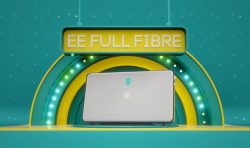 In the UK, EE now offers full fibre broadband that “can handle anything” that you might want to use your home broadband connection for. You can connect up to 100 devices to your EE full fibre connection. You’ll also benefit from a more reliable connection compared to normal fibre broadband.
In the UK, EE now offers full fibre broadband that “can handle anything” that you might want to use your home broadband connection for. You can connect up to 100 devices to your EE full fibre connection. You’ll also benefit from a more reliable connection compared to normal fibre broadband.
At present, you can get EE’s full fibre broadband from just £27.99/month when you order through this link. There’s a choice of three different plans, depending on the speeds you require (Fibre Max 100, Fibre Max 500 and Fibre Max 900).
Get EE Full Fibre from £27.99/month →
In this article, we’ll review EE’s full fibre broadband and the Full Fibre Max plans you’re able to choose from. We’ll also look at the benefits of upgrading to EE full fibre and how you can switch to EE’s full fibre service.
| Prices From: | £27.99 per month |
|---|---|
| Contract Length: | 24 month contract |
| Download Speed: | 145Mbps (Fibre Max 100) 500Mbps (Fibre Max 500) 900Mbps (Fibre Max 900) |
| Upload Speed: | 28Mbps (Fibre Max 100) 73Mbps (Fibre Max 500) 110Mbps (Fibre Max 900) |
| Technology: | Full Fibre FTTP (fibre-to-the-premises) |
| Availability: | 18.3% of UK homes (check your postcode) |
Contents
What is EE Full Fibre?
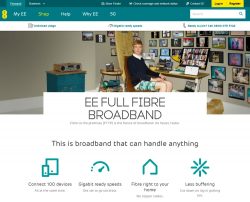 In the UK, EE now offers full fibre broadband with a fibre optic connection going all the way into your home. It’s different from normal fibre broadband where the “last mile” from the cabinet to your home uses an old copper connection.
In the UK, EE now offers full fibre broadband with a fibre optic connection going all the way into your home. It’s different from normal fibre broadband where the “last mile” from the cabinet to your home uses an old copper connection.
There are three main benefits when upgrading to full fibre broadband:
- You can connect up to 100 devices at the same time. According to EE, you can connect up to 100 devices at the same time to their full fibre broadband. This includes streaming, gaming and video calling on more devices at the same time.
- You’ll get speeds up to 18 times faster than the UK’s average broadband. You can get average download speeds of up to 900Mbps. This is 18 times faster than the UK’s average broadband connection (which has an average download speed of 50Mbps). It means downloads will happen a lot faster, with a HD-quality film downloading in as little as 40 seconds.
- You’ll get a more reliable connection with less lag. You’ll benefit from a more reliable service when using full fibre broadband. This is because it isn’t affected by noise and interference in the same way as old copper phone lines. You’ll also get less lag on your connection which will make things more responsive, especially for online gaming.
At present, EE’s full fibre broadband service is available in around 18.3% of UK homes. You can check the availability where you live by entering your postcode on this page.
If you’re currently unable to get full fibre broadband from EE, you can get their regular fibre broadband service from £27.99 per month.
EE Full Fibre Plans

EE offers a choice of three full fibre broadband plans: Fibre Max 100, Fibre Max 500 and Fibre Max 900. The plans differ in terms of the speeds available (with download speeds ranging from 145Mbps to 900Mbps).
All of EE’s full fibre broadband plans come with unlimited usage included. In addition, if you’re an EE pay monthly mobile customer, you can get up to 20GB of extra data added to your phone plan each month.
If you choose the Fibre Max 500 or 900 plans, you’ll get up to 12 months of the Xbox Game Pass Ultimate included. EE pay monthly mobile customers will also get unlimited mobile gaming data on their phone.
The following table shows a side-by-side comparison of the three full fibre plans:
| Full Fibre Max 100 | Full Fibre Max 500 | Full Fibre Max 900 | |
|---|---|---|---|
| Monthly Price: | £27.99 per month | £30.99 per month | £37.99 per month |
| Contract Length: | 24 months | 24 months | 24 months |
| Download Speed: | 145Mbps average | 500Mbps average | 900Mbps average |
| Upload Speed: | 28Mbps average | 73Mbps average | 110Mbps average |
| Inclusive Features | |||
| Usage: | Unlimited | Unlimited | Unlimited |
| EE Mobile Data Boost: | 20GB (4G & 5G phone plans) 5GB (12-month SIM) |
20GB (4G & 5G phone plans) 5GB (12-month SIM) |
20GB (4G & 5G phone plans) 5GB (12-month SIM) |
| Norton Security Premium: | 10 devices | 10 devices | 10 devices |
| Xbox Game Pass Ultimate: | – | 6 months included | 12 months included |
| Smart WiFi: | Add £10/month | Add £10/month | Add £10/month |
| Technology | |||
| Technology: | Full Fibre (also available on Gfast) |
Full Fibre | Full Fibre |
| Router: | EE Smart Router | EE Smart Router | EE Smart Router |
| Availability: | Check availability → | Check availability → | Check availability → |
In the following section, we’ll look at each of three plans in more detail.
Full Fibre Max 100
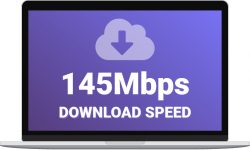 If you’re looking for full fibre broadband at the most competitive price point, EE offers their Full Fibre Max 100 broadband for £27.99 per month. This is reduced from the normal price of £36 per month when you order through this link.
If you’re looking for full fibre broadband at the most competitive price point, EE offers their Full Fibre Max 100 broadband for £27.99 per month. This is reduced from the normal price of £36 per month when you order through this link.
On Full Fibre Max 100 broadband, you’ll get an average download speed of 145Mbps. This is about three times faster than the UK’s average broadband connection and it should allow you to stream ultra-HD video on up to six devices at the same time. You can also download a full HD-quality film in around four minutes. The average upload speed on Full Fibre Max 100 is 28Mbps.
At present, Full Fibre Max 100 broadband is available from £27.99 per month:
| Service | Download Speed | Monthly Cost | |
|---|---|---|---|
 EE Full Fibre 150 | 150Mbps average download | £27.99 per month No upfront fee 24 month contract Monthly cost will rise each April by £4 | See deal |
See all Full Fibre Max 100 deals →
If you choose the Full Fibre Max 100 plan, you’ll get a 20GB data boost on your EE phone plan. Alternatively, there’s a 5GB data boost on your 12-month EE SIM-only plan. You’ll also get the latest EE Smart Router included, along with 12 months of Norton Security Premium anti-virus.
Full Fibre Max 500
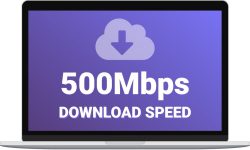 If you’re looking for an even faster connection, Full Fibre Max 500 gives you download speeds that are about 10 times faster than the UK’s average broadband connection.
If you’re looking for an even faster connection, Full Fibre Max 500 gives you download speeds that are about 10 times faster than the UK’s average broadband connection.
On Full Fibre Max 500, you’ll get an average download speed of 500Mbps. This is enough to stream ultra-HD video on 20 devices at the same time, or to download a full HD-quality film in about one minute. You’ll also get an average upload speed of 73Mbps on the plan.
At present, you can get Full Fibre Max 500 broadband for £30.99 per month. This is reduced from the normal price of £45.50 per month when you order through this link.
| Service | Download Speed | Monthly Cost (will rise each April by £4) |
|
|---|---|---|---|
 EE Full Fibre 300 | 300Mbps average download | £30.99 per month No upfront fee 24 month contract | See deal |
 EE Full Fibre 500 | 500Mbps average download | £34.99 per month No upfront fee 24 month contract | See deal |
See all Full Fibre Max 500 deals →
You’ll get up to a 20GB mobile data boost included on Full Fibre Max 500, if you have an eligible Pay Monthly phone plan with EE. You’ll also get the EE Smart Router and 12 months of inclusive Norton Security Premium anti-virus.
Full Fibre Max 900
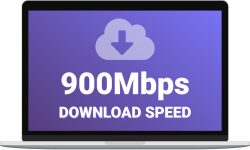 For EE’s fastest available full fibre broadband service, choose the Full Fibre Max 900 plan. This is around 18 times faster than the UK’s average broadband connection.
For EE’s fastest available full fibre broadband service, choose the Full Fibre Max 900 plan. This is around 18 times faster than the UK’s average broadband connection.
On the Full Fibre Max 900 plan, you’ll get an average download speed of 900Mbps. This should allow you to stream, game and video call on up to 100 devices at the same time. You’ll also get an average upload speed of 110Mbps on your Full Fibre Max 900 plan.
You can get Full Fibre Max 900 broadband for £37.99 per month when you order through this link. This is reduced from the normal price of £56 per month.
| Service | Download Speed | Monthly Cost | |
|---|---|---|---|
 EE Full Fibre Gigabit | 900Mbps average download | £37.99 per month No upfront fee 24 month contract Monthly cost will rise each April by £4 | See deal |
See all Full Fibre Max 900 deals →
Like on Fibre Max 100 and Fibre Max 500, you’ll also get a mobile data boost included of up to 20GB per month. You’ll also get EE’s Smart Router included, along with 12 months of inclusive Norton Security Premium anti-virus.
Other Fibre Broadband Plans
 Alongside their full fibre plans, EE also offers normal fibre broadband. This is a good option if you’re not currently able to get the Full Fibre Max plans where you live.
Alongside their full fibre plans, EE also offers normal fibre broadband. This is a good option if you’re not currently able to get the Full Fibre Max plans where you live.
At present, EE’s regular fibre broadband service is available with an average download speed of 36Mbps for £29.99 per month. You can also get their Fibre Plus broadband with an average download speed of 67Mbps for £27.99 per month.
| Service | Download Speed | Monthly Cost (will rise each April by £4) |
|
|---|---|---|---|
 EE Fibre 67 | 67Mbps average download | £27.99 per month No upfront fee 24 month contract | See deal |
 EE Full Fibre 74 | 74Mbps average download | £27.99 per month No upfront fee 24 month contract | See deal |
 EE Fibre 36 | 36Mbps average download | £29.99 per month No upfront fee 24 month contract | See deal |
 EE Fibre 50 | 50Mbps average download | £29.99 per month No upfront fee 24 month contract | See deal |
See all EE Fibre Broadband deals →
The Fibre and Fibre Plus plans are normally offered using fibre-to-the-cabinet (FTTC) technology. This is where a fibre optic connection runs to a cabinet near your home, with the ‘final mile’ between the cabinet and your home using a copper connection.
EE Full Fibre Features
Improved Speeds & Reliability
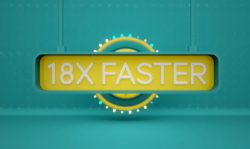 When you sign up to EE’s full fibre broadband, you’ll benefit from download speeds that are up to 18 times faster than the UK’s average broadband connection. This allows you to use more devices at the same time and also to download files much faster.
When you sign up to EE’s full fibre broadband, you’ll benefit from download speeds that are up to 18 times faster than the UK’s average broadband connection. This allows you to use more devices at the same time and also to download files much faster.
Alongside this, you’ll benefit from a more reliable broadband service as the full fibre connection won’t rely on an old copper phone line. There’s also less lag which makes things more responsive, especially if you’re playing games online.
Mobile Data Boost

When you sign up to EE’s full fibre broadband, you can get up to 20GB of extra data added to your EE pay monthly mobile plan.
The amount of extra data you receive will depend on the type of EE mobile plan you have:
- You’ll get 20GB of extra data every month if you have an EE phone plan (including both 4G and 5G phone plans).
- You’ll get 5GB of extra data every month if you have an EE 12-month SIM or 5G Smart SIM.
There’s more information about the mobile data boost on EE’s website.
Smart Hub Router
 You’ll get EE’s latest Smart Hub Router included when you sign up for their full fibre broadband service.
You’ll get EE’s latest Smart Hub Router included when you sign up for their full fibre broadband service.
The Smart Hub Router will connect to EE’s full fibre network, producing a Wi-Fi network from it that other devices can connect to. It has 7 built-in Wi-Fi antenna to optimise the performance of your network and supports dual-band Wi-Fi 5 technology.
Alongside the Wi-Fi connectivity, you’ll get 4 Gigabit Ethernet sockets on the back of your router. This allows you to connect wired devices to your home network.
The following table shows the full technical specifications of the EE Smart Router:
| EE Smart Router | |
|---|---|
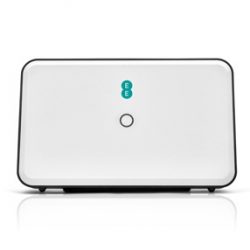 |
|
| Availability | |
| EE Broadband Plans: | Full Fibre Max 100 Full Fibre Max 500 Full Fibre Max 900 |
| Connectivity | |
| Dual-Band Wi-Fi: | Yes |
| Wi-Fi Connectivity: | 802.11a/b/g/n/ac |
| Wi-Fi Speed: | Up to 2,533Mbps |
| 2.4GHz Wi-Fi: | 3×3 MIMO (up to 800Mbps) |
| 5GHz Wi-Fi: | 4×4 MIMO (up to 1,733Mbps) |
| Mesh Wi-Fi: | Requires Smart WiFi (add £10/month) |
| Ethernet: | 4 Gigabit Ethernet ports |
| USB ports: | 1 USB 2.0 port |
| Other: | WPA2 / WPA security Automatic channel selection & optimisation |
| Other | |
| Colour: | White |
| More Information: | EE Website |
Smart WiFi Add-On
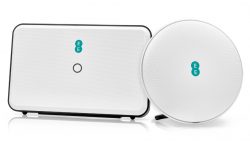 For an extra £10 per month, you can add EE’s Smart WiFi add-on. This includes a Wi-Fi boosting Smart Disc which uses mesh wi-fi technology to improve the Wi-Fi signal in your home.
For an extra £10 per month, you can add EE’s Smart WiFi add-on. This includes a Wi-Fi boosting Smart Disc which uses mesh wi-fi technology to improve the Wi-Fi signal in your home.
The EE Smart WiFi Disc works together with your EE Smart Router to give you a single Wi-Fi network covering your whole home. By giving you a stronger Wi-Fi signal, it should reduce Wi-Fi blackspots as well as giving you better speeds across your home.
The Smart WiFi add-on also includes a 4GEE WiFi Mini hotspot. This comes with 2GB data per month so you can use it to get online with a mobile broadband connection on-the-go. If there’s ever a fault with your fibre broadband service, the hotspot will be boosted with an extra 250GB of data to keep you connected.
Switching To EE Full Fibre
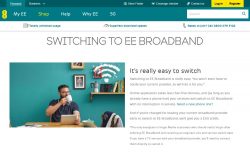 If you’re switching from another broadband provider to EE’s full fibre service, it’s easy to do this.
If you’re switching from another broadband provider to EE’s full fibre service, it’s easy to do this.
Start by ordering your new full fibre plan on EE’s website. When you place your order, you’ll be able to choose an installation date for your service (typically for around two weeks time).
Once you’ve placed your order online, EE will normally contact your old provider to cancel your old service. This is unless you’re a Virgin Media customer, in which case you’ll need to call them separately to cancel. If you’re charged by your old provider for cancelling your service early, you can apply for a £50 bill credit from EE.
For step-by-step instructions on how to change your broadband provider to EE, please select your current provider from the drop-down menu below:
Switch to EE Broadband
Your step-by-step guide to switching
For further information, see our in-depth guide to switching broadband providers in the UK.
Frequently Asked Questions
| What is EE full fibre broadband? | EE’s full fibre broadband uses a fibre optic connection all the way into your home. It gives you download speeds of up to 900Mbps, allowing you to use up to 100 devices at the same time in your home. |
|---|---|
| What speeds are available on EE’s full fibre broadband? | You can get download speeds of up to 900Mbps on EE’s full fibre broadband. This depends on the plan you choose:
In addition, EE also offers regular fibre broadband plans with an average download speed of 36Mbps or 67Mbps. |
| Is EE’s full fibre broadband available where I live? | At present, EE’s full fibre broadband service is available in around 18.3% of UK homes. You can check the availability where you live by entering your postcode on EE’s website. |
More Information
For more information about EE’s full fibre broadband, please see the official EE website. You can also see the best EE full fibre broadband deals.

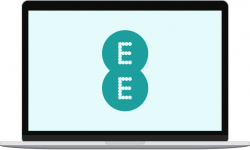


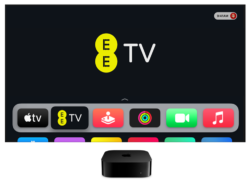


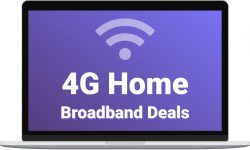

Dom said:
Hi
i’m on EE 900mbps fibre. what actual speed do you all get WIRELESS ?
i only get the full speed using wired connection, the most speed wireless is never more than 450mbps. How can I improve the speed? would a better router help? all connections were checked and working fine. i would appreciate your comments, thanks
Rich said:
Do you know if you can configure 2.4 GHz and 5GHz separately? I had to ditch the bt router and drop back to the earlier by router as the smart hub wasn’t smart and lowered all devices to the slowest 2.4 GHz speed. Also any VPN restrictions (need VPN) for wfh. I assume will work fine with powerline adapters? Tplink… The 500 offer looks tempting
Linas said:
I find it strange that upload is limited to 110Mbps on FTTP, that is because fibre connection are usually symmetric and there is no benefit of offering asymmetric speeds.
It made sense on old broadband connections as it was technological limitation, hence “bands” were allocated to download which is more important to most consumers. But this makes no sense on fibre as it is inherently symmetric – especially the last leg of non-fibre ethernet most consumers get at home.
So my guess is that this has nothing to do with technical limitation, but rather few business related decisions – first of all EE does not have their network, they purchase network capacity from likes of Openreach or Plusnet, so it is cheaper to buy 1100Mbps, than it is 2000Mbps (the only reason most of fibres are symmetric is that cost difference is quite small here unlike on broadband or FTTC).
But more important reason is that they don’t want to jeopardise their their enterprise business. If enterprise customer can get 1Gbps uploads on consumer line without data restrictions, then what is the point to get £1000/month enterprise line?
On other hand Hyperoptic offers symmetric speeds, because 1 – they own their own lines, so the cost of extra bandwidth is not relevant… and 2 – they don’t have massive enterprise business, so they don’t care about hurting it.
I was interested to see if EE offers this in my area, but sadly they don’t and most importantly it would me no sense for me to switch, however it would be nice to have this option when it comes to negotiation with Hyperoptic.
In last few year Hyperoptic was getting cheeky with their speeds, but they can do it because they know that I have no alternative.
For example on my Hyperoptic 1Gbps connections I have no issue pushing 950Mbps uploads all day long since I got it 5 years ago, but downloads were steadily going down as more and more people subscribed in the estate – on day one I was able to do ~920Mbps downloads, but a year later it was already 850Mbps and by now I am happy if I get even 750Mbps during peak hours. In other hand I am only paying £35/Month on 24 Month plan. Whereas inferior 900/110Mbps connection would cost me £50/Month with EE.
My only hope is that Community Fibre will roll out their 3Gbps fibre near me soon.
Nana replied:
>”I find it strange that upload is limited to 110Mbps on FTTP”
So one don’t start home hosting service. While similar speed can be only $5/mo datacenters usually get extra via hardware rent or collocation cost.
eafx said:
Hi Ken,
Do you know if it’s possible to use a 3rd party router with EE Fibre Max plans like it’s possible with BT?
Niels replied:
Yes. I use a homebrew Opnsense router with EE FTTP built on a cheap i3 8100 PC. Rock solid, highly recommended.
Devavrat Kulkarni said:
Can you attach a digital phone to the router and use it VoIP? I believe this is possible on BT router?
Ken replied:
Hi there,
My understanding is that EE doesn’t currently offer a landline option on their FTTP plans. I believe you’ll need to go to BT if you want a landline option.
Ken
pxpik said:
it is interesting, why upload speed only 110?
why it is not symmetrical
Ken replied:
Hi there,
Thanks for your comment. For commercial reasons, Openreach (who provide the network for EE’s FTTP service) have decided to offer asymmetric speeds on full fibre. I suspect this is simply because the average household uses downloads more often than uploads. Some of the altnets like Hyperoptic and Cityfibre have symmetric speeds, but they’re only available in selected areas.
Ken